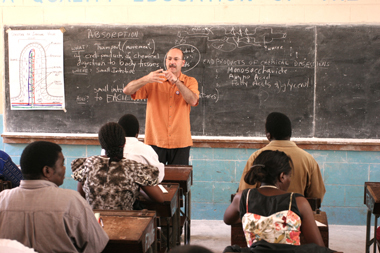Page Content
Shelley Svidal
What would you do if your communications and information technology workshop were upstaged by an international cricket tournament?
That’s exactly what happened to the Alberta Teachers’ Association earlier this spring when a workshop it had planned to run in Barbados for members of teachers’ organizations in the Caribbean coincided with ICC Cricket World Cup 2007. Every hotel in the region was booked, and the ATA was advised to cancel the workshop. The ATA responded by diverting the $19,000 budgeted for the workshop to Sindicato Nacional dos Professors de Mozambique, the national teachers’ organization, to run a series of teacher education workshops in the northern part of the African country.
ATA Staff Officer Tim Johnston, who is in charge of the ATA’s international assistance program, says the program supports the United Nations’ millennium development goal for education—to achieve universal primary education. The program began in 1964, when the Association sent two teachers on the Canadian Teachers’ Federation’s (CTF’s) Project Overseas. In 1991, the Annual Representative Assembly concurred with ATA Past President Brendan Dunphy’s recommendation to commit 1 per cent of the previous year’s operating budget to international assistance, beginning in 1992/93, and that commitment has continued. In addition, the ATA can draw upon an additional $13,500 each year to help teachers in developing countries who require immediate assistance as a result of natural or man-made disasters. A total of $176,700 was spent on international assistance in 2006/07, and the Association applies for an annual grant of up to $25,000 from the Wild Rose Foundation to help offset the cost of the program.

Photo courtesy of Jean-Paul Gaboury
"Alberta teachers are going overseas to lend their time, energy and expertise to their colleagues," Johnston explains. "They give and they get in equal measure." He points out that everything the ATA does in the area of international assistance is done by invitation only. Collegiality and friendship define the program.
Most of the funding for the projects, including Project Overseas, is channelled through CTF. Since 1964, the ATA has sent 346 teachers on Project Overseas at a total cost of $2.5 million. Ten teachers will provide professional assistance through Project Overseas this summer to their colleagues in Malawi, Ghana, Dominica, Guyana, Nigeria, St. Vincent, Togo, Uganda and Mongolia, at an average cost of $10,000 per Alberta participant.
The ATA is active in Africa, the Caribbean and Central America, and Asia. In Africa, the Association sponsors workshops on website development through the Pan African Teachers’ Centre for representatives of African teachers’ organizations. The workshops, which have been held in Togo, Kenya, the Gambia, Cameroon and Nigeria, are led by members of the ATA’s Educational Technology Council. The Association’s funding helps support the attendance of African participants, covers venue costs, and pays the travel and accommodation costs of the Alberta workshop leaders.
In the Caribbean and Central America, the ATA supports an information technology project in Dominica in conjunction with Palliser Regional Division, a development program in Belize in conjunction with Greater Black Gold Teachers’ Local, the women’s wing of the Honduran teachers’ organization in conjunction with CoDevelopment Canada, and the Haitian teachers’ union.
In Asia, the Association has assisted the emerging East Timor Teachers’ Union for the past four years, funding general union operations, membership recruitment and basic communications.
Also In the News
